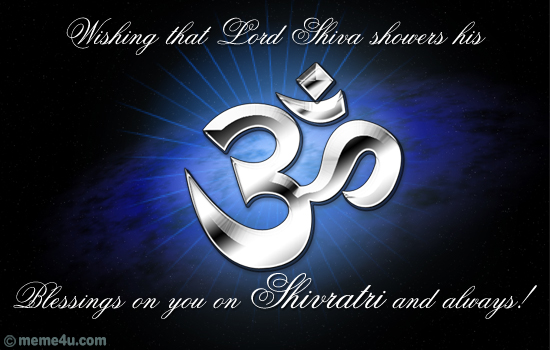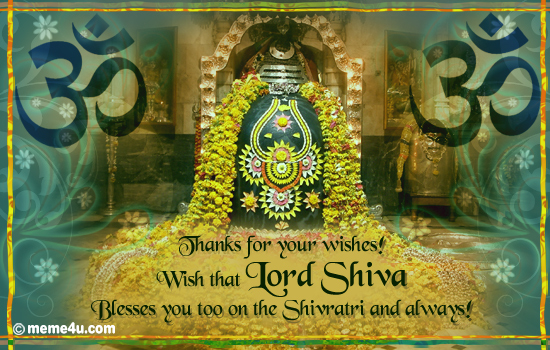Shivo Karta, Shivah Karma
Shivah Karanatmakah..
Meaning:
Shiva is the experiencer and the highest object of experience. Shiva is the goal of Sadhana. There is nothing apart from Shiva. There is nothing other than Shiva. Whatever there is, is Shiva. There is nothing, which is not Shiva. There is no place, which is not Shiva. There is no time, which is not Shiva. To be aware of this is to be aware of Shiva.



Naagendra haaraaya thriloochanaaya bhasmaangadhaaraaya maheshwaraaya
Nityaaya shudhdhaaya digambaraaya tasmai na-kaaraaya namahshivaaya
Salutations to Shiva who wears a serpent as garland, who is three-eyed, whose bare body is covered with ashes, who is forever pure and the very embodiment of sacrifice.
There are many legends associated to the festival of Maha Shivaratri. One of the most popular legends, Shivaratri marks the wedding day of Lord Shiva and Parvati. It is believed that it was on the auspicious night of Shivaratri that Lord Shiva performed the 'Tandava', the dance of the primal creation, preservation and destruction. Another popular Shivratri legend stated in Linga Purana states that it was on Shivaratri that Lord Shiva manifested himself in the form of a Linga. Hence the day is considered to be extremely auspicious by Shiva devotees and they celebrate it as Mahashivaratri - the grand night of Shiva.
- According to the Shiva Purana, there is a special significance of the six essential puja items used in the Shiva worship.
- Bathing of Shivalinga with water, milk and honey and wood apple or bel leaves added to it, represents purification of the soul.
- The vermilion paste applied on the linga after the ritual bath represents virtue.
- Offering of fruits symbolizes longevity and gratification of desires. Burning of incense sticks yields wealth.
- The lighting of the lamp symbolizes attainment of knowledge. Offering of betel leaves marks satisfaction with worldly pleasures.
The prayers and worship continue late into the night when the devotees offer coconut, Bilva leaves (which have to be a stalk with three leaves), fruits, and specially prepared sacred food to Shiva and his consort Parvati. Offering leaves of a Bilva tree (Aegle marmelos tree) to Lord Shiva on Shivaratri is considered very auspicious.
Om Namah Shivaya! O Ashutosh! you are my inner Self. My mind is Parvati. My ten states of prana (life force) are your servants. My body is your house. My actions in this world are your worship. My sleep is Samadhi. My walk is circumambulation (the act of walking around) of you. My speech is your prayer. Thus do I offer all that I am to you. Om Namah Shivaya!
- Keep on chanting whole day Shiv-Panchakshri Mantra...''Om Namah Shivaay''
Vishvesharaya Mahadevaya
Trayambakaya Tripurantakaya
Trikagni - Kalaya
Kalagni - Rudraya Neel - Kanthaya Mrityunjaya
Sarveshvaraya Sadadhivaya
Sriman Mahadevaya Namah.
Meaning:
Om. I bow down to Lord Shiva, who is the creator and protector of the universe, who is the greatest among Gods, who has three eyes, who is the annihilator of all the three worlds, one whose throat is blue, who is the conqueror of death, who is the Lord of all, who is propitious who is possessed of all marks of greatness and who is the greatest among Gods. To him my prostration.
May the Blessings Of Lord Shiv-Shankar,



No comments:
Post a Comment